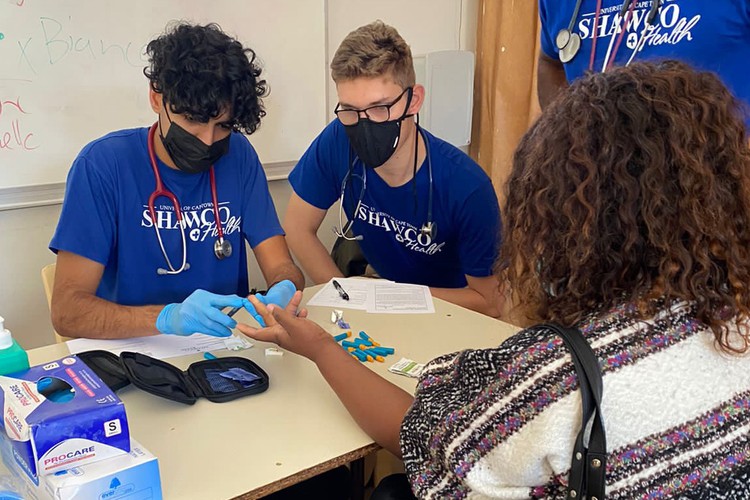Student organisation SHAWCO bounces back to celebrate 80th birthday
The welfare organisation aims to be operating at 100% capacity by the end of 2023
Students at the Kensington Mom and Baby Clinic: from left Muhammad Mitha and Johann Kok. Photo: SHAWCO Media Library
- The University of Cape Town’s Students Health and Welfare Organisation marks its 80th birthday next year.
- The student-led organisation, which went through several difficult years, has bounced back and plans to be operating at full capacity again in 2023.
- SHAWCO operates in Gugulethu, Khayelitsha, Philippi, Masiphumelele, Imizamo Yethu, Hangberg, Wynberg and Kensington, offering health and education services run by students and supervised by professionals.
Student-led welfare organisation SHAWCO is preparing to mark 80 years next year, and plans to be back at 100% capacity after several difficult years.
A few years ago SHAWCO (Students Health and Welfare Organisation) went through a difficult patch, accumulating debt which was then paid off by the University of Cape Town. The organisation had to cut back on some of its work and then went through a restructuring process.
SHAWCO, established by student volunteers in 1943, provides free healthcare and education to underserved communities in Cape Town. During apartheid, the organisation became well known for providing medical services to protesters during conflicts with the police.
SHAWCO’s executive director Dr Jackie Stewart said the model was reciprocal, with UCT students providing services to people in the communities, and people in the communities providing students with experience and insight. Students are supervised by professionals.
“We have a dedicated team of community healthcare workers, doctors, physiotherapists, audiologists, speech therapists, occupational therapists, and social workers, that support and supervise students at the clinics and within the school system.”
There are permanent offices in Kensington and Khayelitsha, and two mobile clinics.
But with funding cuts and Covid, Stewart said, the organisation had been working at 50% capacity for the last two years. “At full capacity, SHAWCO health had over 1,000 medical and health rehab students registered, 200 clinics ran per year, seeing over 5,000 patients. SHAWCO education had 1,250 student volunteers and ran programmes with over 1,500 learners.”
“As SHAWCO was recovering from the events of 2019, Covid hit. UCT went into full lockdown. SHAWCO’s funding arm, run by UCT students, similarly went into lockdown, unable to generate funds for us. This was a bitter blow at a time that we needed funding the most,” said Stewart.
She said the organisation turned to SHAWCO alumni across the world for help.
Support was received from individuals and the Australian alumni trust ran fundraising campaigns which brought in close to R2-million. There was also corporate support. Dell Technologies came in to sponsor digital literacy programmes and computer labs.
SHAWCO is currently present in Gugulethu, Khayelitsha, Philippi, Masiphumelele, Imizamo Yethu, Hangberg, Wynberg and Kensington.
SHAWCO Health offers adult night clinics, women’s health clinics and paediatric clinics. SHAWCO education offers digital literacy and violence prevention workshops for Grade 10 and Grade 11 learners. SHAWCO law, which is run by LLB students, runs workshops with the learners regarding how the legal system can protect them, their families and friends.
“We still remain working at 50% capacity,” said Stewart. “In 2023 SHAWCO has its 80th anniversary. Our aim is to reach 100% capacity by the end of 2023.”
“We are asking all SHAWCO alumni to get in touch with us, to help in whatever capacity they can.”
Support independent journalism
Donate using Payfast

Don't miss out on the latest news
We respect your privacy, and promise we won't spam you.
Next: Concourt did not legalise weed in the workplace – Labour Court rules
Previous: Parliament silent on MPs implicated in PRASA corruption
© 2022 GroundUp. This article is licensed under a Creative Commons Attribution-NoDerivatives 4.0 International License.
You may republish this article, so long as you credit the authors and GroundUp, and do not change the text. Please include a link back to the original article.
We put an invisible pixel in the article so that we can count traffic to republishers. All analytics tools are solely on our servers. We do not give our logs to any third party. Logs are deleted after two weeks. We do not use any IP address identifying information except to count regional traffic. We are solely interested in counting hits, not tracking users. If you republish, please do not delete the invisible pixel.

